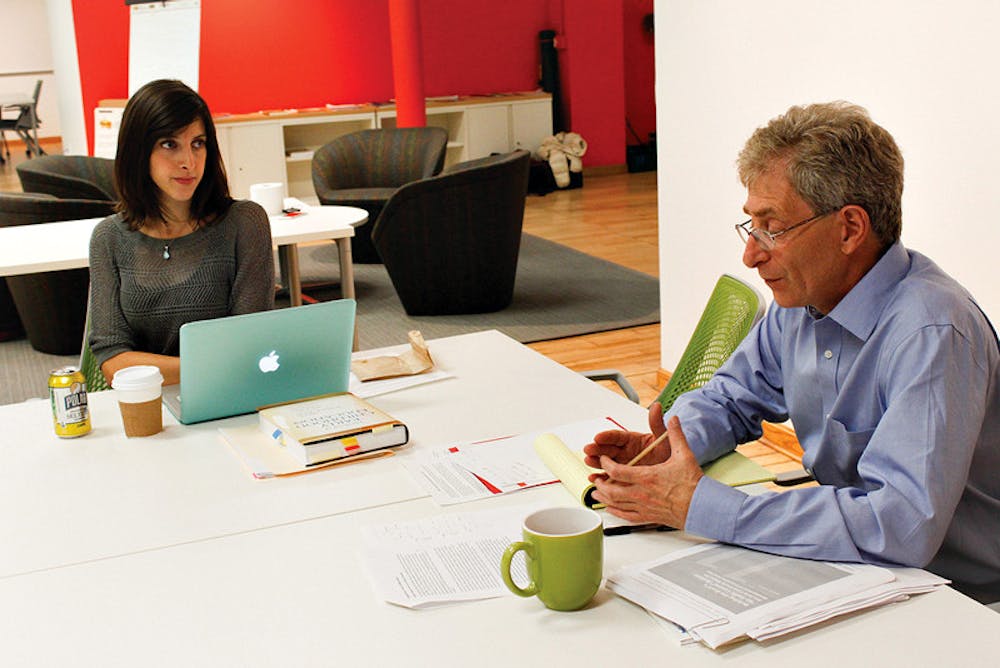As the TRI-Lab’s inaugural project nears the end of its first semester, the pilot lab on childhood development is functioning as both a specific community engagement initiative and a forum for dialogue focused on improving and expanding the program into the future.
The TRI-Lab, run by the Swearer Center for Public Service, creates collaborative projects amog students, faculty members and community partners, offering course credit and grants for students to strengthen University ties with the community and add a real-world aspect to classroom learning. The pilot lab, which launched this semester, focuses on human development from pre-conception to early childhood, studying education and family dynamics.
Start of something new
The pilot lab contains 10 students, five community partners and three faculty members, though the program aims to eventually have 25 students, five community partners and five faculty members associated with each project.
The future development of the TRI-Lab initiative was singled out as a goal of President Christina Paxson’s strategic plan.
Those involved with the current lab, chosen last spring, said they are pleased with the progress this individual project has made.
“It’s been off to a great start,” said Roger Nozaki MAT ’89, director of the Swearer Center.
The lab is broken up into three “work teams,” said Allen Hance, director of the TRI-Lab. One team is working on “issues related to high-risk mothers,” another on “parent-family engagement issues” and the last on “issues in neurological development and the implications for curriculum development for young children,” Hance said.
The TRI-Lab plans to follow a “three-phase model,” Nozaki said, consisting of a “cultivate phase,” “collaborate phase” and “innovate phase.” Due to time constraints in getting the program off the ground this year, the members of the childhood development lab “jumped pretty directly into the collaborate phase,” he said.
Dean of the College Katherine Bergeron has voiced support for “community-based courses” as a future part of the cultivate phase, which Nozaki described as “a set of events and activities that raise awareness of future TRI-Lab topics.”
The beginning stages of this year’s pilot lab consisted of “research,” “surveys” and establishing “areas of interest” in order to split up into the three work groups, said John Molina MD’14, a current TRI-Lab member. The project has a three-hour meeting each week, along with additional workshops, events and projects, he said.
Most of the time “has been (spent) on Brown’s campus,” Molina said, adding that “the second semester will be much more … community-focused once we’ve invested that time in understanding the space.”
Molina, who does not receive credit for the lab, called it “a valuable experience” due to participants’ chance to engage with policy.
Next experiments in the Lab
Despite the enthusiasm for the current project, participants in the pilot lab said they realize they have perhaps an even more important job to do: critique themselves.
“There’s two parts — not only am I doing this work on this specific lab topic, but really thinking about how can the lab run better in the long term,” Molina said.
For Molina, this “open dialogue” includes considering the preparatory work required. “What we did over the beginning of the semester — some of the reading and some of the groundwork — would be better done over the summer ... so that people come into it in the fall ready to be active,” he said.
Time commitment remains an important topic of discussion, especially for students looking to gain credit from the program. Each lab counts for half a credit per semester, Molina said, but “because of the amount of time that we’re spending on it, it might switch to one credit each semester for future labs.”
“We didn’t know that it would take quite as much time for us to work together in designing the course,” Hance said.
For Stephen Buka, faculty co-chair of the pilot lab, establishing a system of dialogue within the classroom is crucial to the program’s success. “To get 18 people and give them all a chance to speak when they’re all saying different things ... is a challenge,” he said.
Allowing for different perspectives while still making an impact with the project will be an important feature of the TRI-Lab program, especially if it expands, he added.
While the 10-student lab falls short of the 25-student standard TRI-Lab administrators envision for future labs, faculty members and administrators said they recognize the benefits of easing into the program. “It’s been very good for the pilot year to have closer to comparable numbers of faculty, community and students because we get a better, clearer statement of the priorities and perspectives … of the individual groups,” Buka said.
Nozaki said the Swearer Center will be actively recruiting faculty leaders and students for future projects — including next year’s, the proposals for which are due today.
“Twenty students in the next lab is my guess,” Hance said.
The ultimate goal is to launch multiple TRI-Lab projects each year, though the expansion will happen gradually, Nozaki said.
Broader thematic considerations also come into play for the TRI-Lab’s leaders. Hance said the strategic plan calls for TRI-Lab to “be a place for ... integrative scholarship” and to “connect academic and real-world experience.”
The TRI-Lab’s development will also focus on “in-depth community relationships” as well as relating the community work to “Brown’s academic mission,” Nozaki said.
Participants believe success for the program will build on the foundation of partnerships in the city and state.
“Just the fact that we have protected time for faculty to talk to community participants is such a rarity that we’ve already built extremely strong ties,” Buka said.

ADVERTISEMENT




